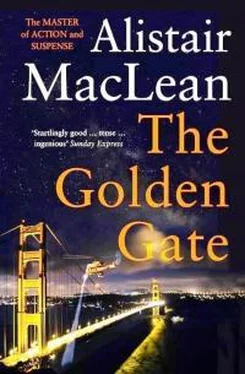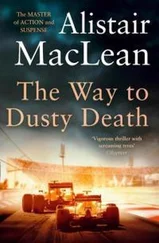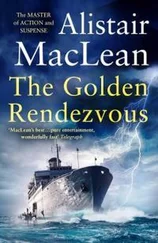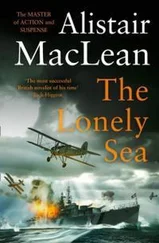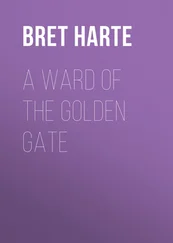It was at that moment that the bridge and the whole of northern San Francisco blacked out.
For some few seconds the silence on the bridge was total. The darkness wasn’t total but it came fairly close to being that way. The only illumination came from the faint lighting from the coaches – to conserve the batteries most of the individual reading lights were out, the others dimmed – and the orange-red glow from the distant oil fire. Van Effen said softly: ‘Your antennae, Mr Branson. You know you could make a fortune hiring them out.’
‘Start up the generator. We’ll have the searchlights on the north and south towers. See that the self-propelled guns are ready, loaded, crews standing by. Three men with submachine-guns to be by each gun. I’ll go south, you north and alert them. After that, you’re in charge of both. I’ll try to find out from that bastard Hendrix what this is all about.’
‘You don’t seriously expect a frontal assault, Mr Branson.’
‘I frankly don’t know what the hell to expect. What I do know is that we take no chances. Hurry!’
Branson ran south. As he passed the rear coach he shouted: ‘Chrysler! The generator. Quick, for God’s sake.’
The generator was running before either Branson or Van Effen reached the respective defensive positions. The powerful searchlights came on illuminating both towers: the reverse effect was to plunge the central portion of the bridge into even deeper gloom than before. The guns were readied, machine-gunners in close attendance. Van Effen stayed where he was. Branson ran back towards the central coach. But both Branson and Van Effen were concentrating their efforts on the wrong things and in the wrong direction. They should have been where Revson was.
Revson was crouched in the nose section of the leading helicopter, the variably shuttered flashlight in his hand reduced to scarcely more than a pinhole of light. He had had no trouble in locating the triggering device: it was between the pilot’s seat and the one opposite to it.
With the screwdriver blade of his knife Revson had already removed the four screws that secured the top-plate and the top-plate itself. It was a simple enough device. On the outside of the device was a vertical lever padlocked in position in its top position. When this was depressed it brought a copper arm down between two spring-loaded interior copper arms, so completing the circuit. Twin pieces of flex led from those last two to two crocodile spring-loaded clamps, each secured to the terminals of two nickel-cadmium Nife cells connected up in series. That would produce a total of only three volts, little enough, one would have thought, to activate the radio trigger: but that Branson would have it all expertly calculated out in advance Revson did not for a moment doubt.
He didn’t bother to sever or disconnect anything. He merely removed the crocodile clips from the terminals, lifted the Nife cells free, broke the connection between them and stuffed one in each jacket pocket. Had he disconnected or severed anything Branson could have carried out some sort of jury rig: but Revson would have wagered heavily that Branson carried no spare Nife cells. There was no earthly reason why he should have done. He began to replace the cover-plate.
Hendrix sounded angry, a man near the breaking point of exasperation. ‘What do you think I am, Branson? A bloody magician? I just sit here and snap my fingers and presto! all the lights in the north half of the city go out? I’ve told you and I tell you again that two of the main transformers have gone out. How I don’t know yet, but you don’t have to be a genius to know that our old friend from the skies above has been at work again. What did you expect us to do – throw in a tank regiment against you? We knew you had those heavy guns and searchlights – and your priceless hostages. Think we’re morons? I’m beginning to think that you’re the moron. I’m beginning to think that you’re losing your grip. I’ll call back.’ Hendrix hung up. Branson did the same, almost smashing the rest in the process. It was the second occasion in a very brief space of time that it had been suggested to him that he was losing his grip. His lips were compressed. It was a suggestion he didn’t much care for, far less care to contemplate. He remained seated where he was.
Revson closed the helicopter door softly and dropped lightly to the ground. A few paces away he could see O’Hare silhouetted against the still towering but slowly diminishing flames. He called his name softly and O’Hare approached.
‘Let’s walk to the west side,’ Revson said. ‘No shooting practice?’
‘Nobody as much as looked at the place, far less came near it. Even if they had looked, I doubt whether they would have seen anything. After staring so long at that fire and the fireworks, looking back to the centre of the bridge would have been like looking into total darkness. You know, no night sight.’ He handed Revson the white pen. ‘Have your little toy back. I remain ethically unbent.’
‘And you can have your flashlight back.’ Revson handed it over. ‘I suggest you return it to your ambulance. At the same time I suggest we might retrieve that pistol and give it to General Cartland. I also suggest you give it to him. I don’t want to be seen being too chummy with the General. Tell him not to use it till he gets the word. Ever seen one of those before?’ He took a Nife cell from his pocket and handed it to O’Hare who peered at it in the near darkness.
‘Some sort of battery?’
‘Yes. There were two of them and I have the other. They were to be used to power the explosives’ triggering device.’
‘And you left no trace of your coming and going?’
‘None.’
‘So we walk towards the side of the bridge.’
They lobbed the cells into the Golden Gate and walked to the ambulance. O’Hare ushered Revson in first, then followed, closing the door. He said: ‘I think we should use the torch. The sudden appearance of bright lights in the windows might attract suspicious attention. After all, we’re supposed to be out there enjoying the sights.’
It took O’Hare less than two minutes to break the Cardiac Arrest Unit seal, lift out some equipment, open up, after a series of intricate operations, a secret compartment in the bottom of the box, retrieve the cyanide gun, replace the equipment, close and reseal the lid. O’Hare placed the gun in an inside coat pocket and said complainingly: ‘I’m beginning to become ethical all over again.’
Hendrix said over the phone: ‘It wasn’t the transformers after all. There have been so many breaks and shorts in the city’s electrical equipment tonight that the generators’ overload coils just packed up.’
‘How long?’ Branson asked.
‘A few minutes. No more.’
As was his habit, General Cartland was standing alone by the east barrier. He turned and saw O’Hare who said quietly: ‘A word, sir, if you please.’
The lights of San Francisco and the Golden Gate Bridge came on five minutes later. Branson left the Presidential coach and went to meet Van Effen. He said: ‘Still think I could make a fortune hiring out my antennae?’ He was smiling.
Van Effen wasn’t. He said: ‘Do me a favour. Just hang on to them a little while yet.’
‘Don’t tell me your antennae are at work too?’
‘If they’re not, they sure have good stand-ins.’
The last of the fireworks fizzled to extinction, the oil fire in Fort Mason sank down into a sullen deep-red glow, the lightning and thunder eased, although not markedly so, but the rain showed no sign of abating: had fire broken out in San Francisco that night, it would surely have been rained to extinction. Now that the night’s entertainment was patently over, everyone became very conscious that the rain had become very chilly indeed. There was an almost concerted movement back to the coaches.
Читать дальше
Конец ознакомительного отрывка
Купить книгу
